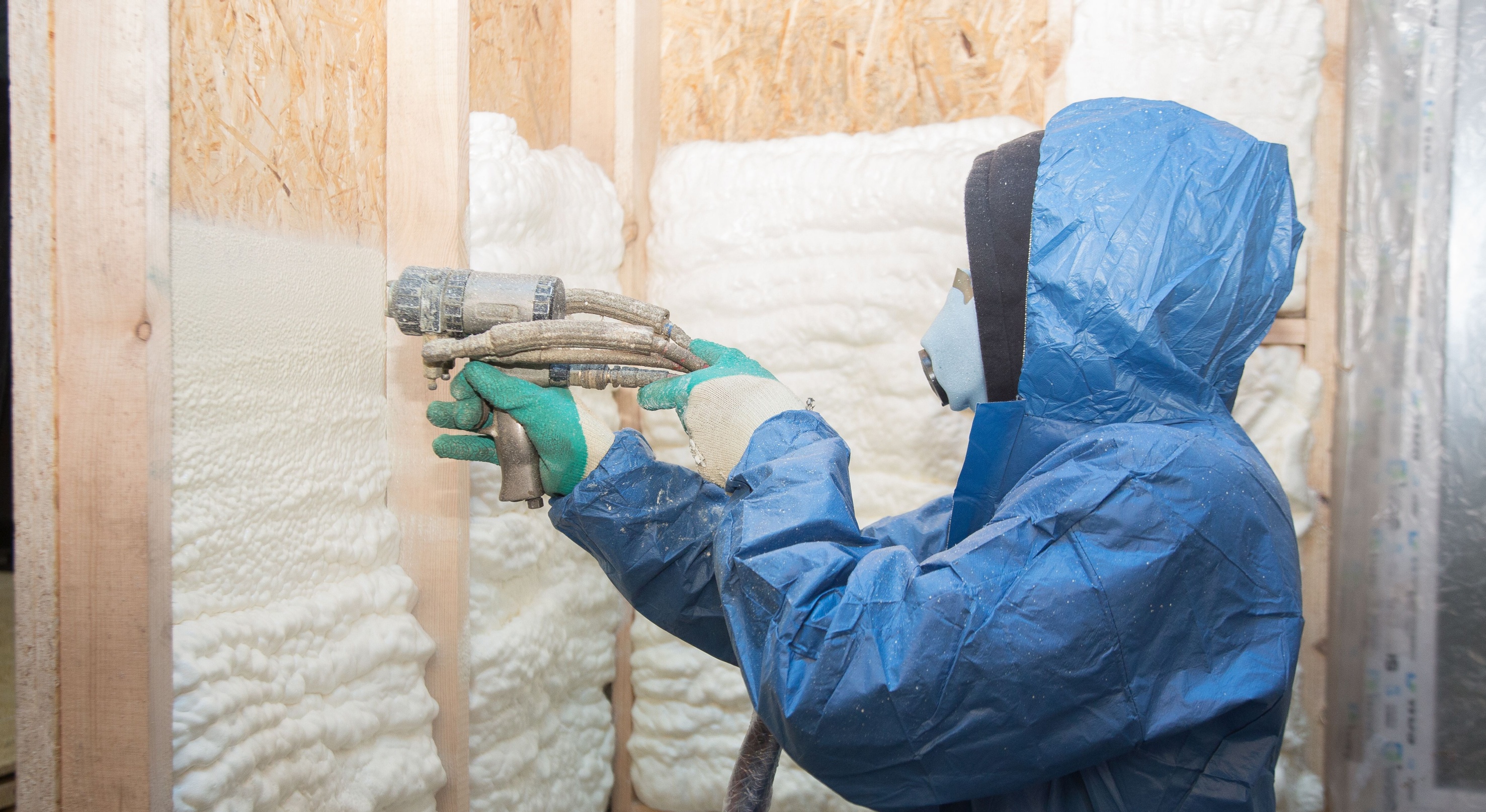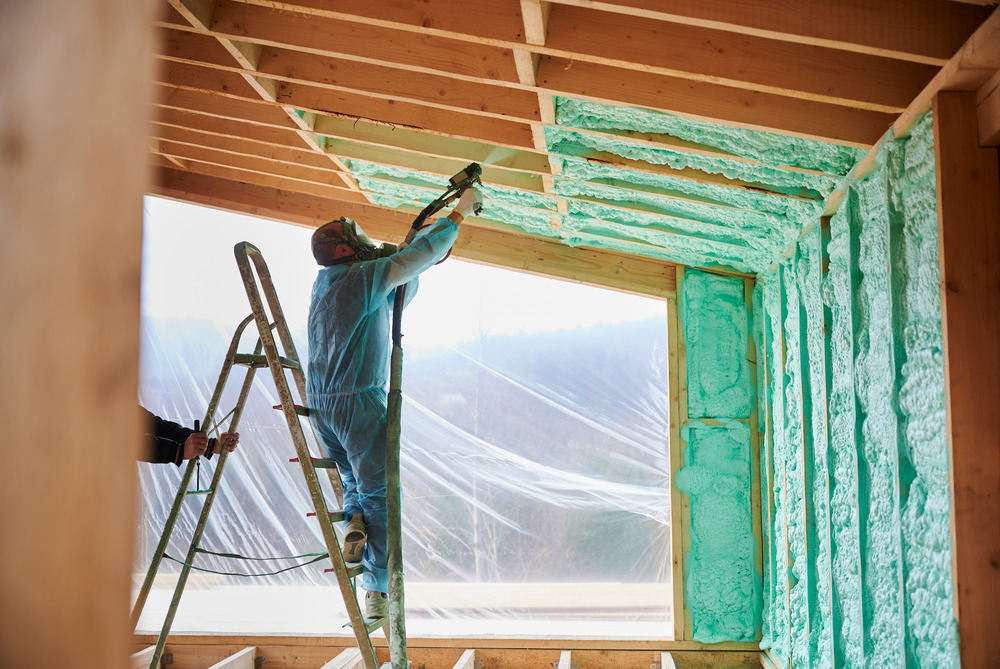Choosing the Right Kind Of Spray Foam for Your Insulation Needs
Choosing the Right Kind Of Spray Foam for Your Insulation Needs
Blog Article
Spray Foam: The Ultimate Service for Air Sealing and Insulation
Spray foam insulation has actually emerged as a leading solution for efficient air sealing and thermal insulation, offering an one-of-a-kind combination of properties that set it in addition to conventional techniques. Its capacity to expand and load voids makes it especially effective in avoiding air leak, which can significantly influence power performance. Understanding the full range of its advantages, installation procedures, and contrasts with various other insulation types is important for making educated choices. As we discover these aspects, the effects for both brand-new building and constructions and retrofits become significantly considerable. What variables should influence your choice?
What Is Spray Foam?
Spray foam is a functional insulation material that combines the principles of air sealing and thermal resistance to improve energy performance in structures. Made up mostly of polyurethane or various other comparable substances, spray foam is applied as a liquid that increases upon contact with surfaces, creating a solid, continual layer of insulation. This unique home enables it to fill up spaces, fractures, and voids that conventional insulation materials may forget, supplying a superior air seal.
There are two major sorts of spray foam: open-cell and closed-cell. Open-cell spray foam is lighter and much more flexible, offering exceptional audio absorption and a lower R-value per inch - Spray Foam. On the other hand, closed-cell spray foam is denser, providing a greater R-value, moisture resistance, and included structural stability to building parts
The application procedure usually involves specific devices, guaranteeing a smooth application that adheres to various substrates, including steel, timber, and concrete. This flexibility makes spray foam suitable for both new buildings and retrofitting existing structures. Its ability to create an airtight barrier substantially adds to minimizing energy intake and improving interior air quality, thus making it a recommended choice amongst home owners and home builders alike.
Advantages of Spray Foam Insulation
Among the most considerable advantages of spray foam insulation is its remarkable ability to develop a continual air barrier, which effectively reduces power loss. Unlike standard insulation products, spray foam expands to fill up fractures and spaces, making certain that air leak is substantially lowered. This characteristic not just boosts power performance but likewise results in decrease utility bills with time.
Furthermore, spray foam insulation supplies remarkable thermal resistance, adding to an extra stable indoor atmosphere. Its high R-value per inch permits reliable insulation in constrained areas, making it suitable for attics, wall surfaces, and crawl rooms. The moisture-resistant residential properties of spray foam assistance stop mold and mold development, advertising healthier living conditions.
One more important benefit of spray foam insulation is its sound-dampening top qualities (Spray Foam). It properly reduces noise transmission between rooms, creating a quieter and extra comfy home atmosphere. The resilience of spray foam additionally stands apart, as it does not sag or resolve gradually, preserving its performance throughout its life-span
Exactly How Spray Foam Functions
Understanding how spray foam insulation functions is crucial for valuing its effectiveness in air sealing and thermal resistance. Spray foam insulation includes two primary elements: check my site isocyanate and polyol material. When these parts are combined, they go through a chain reaction that causes the product to expand quickly, creating a thick foam that loads voids, dental caries, and splits.
As the foam expands, it complies with surface areas, forming a closed seal that significantly lowers air infiltration. This characteristic makes spray foam insulation highly reliable at stopping drafts and dampness penetration, which can cause energy loss and damages with time. Furthermore, the closed-cell variant of spray foam provides exceptional thermal resistance as a result of its stiff structure, effectively reducing warmth transfer.
The unique residential or commercial properties of spray foam permit it to comply with uneven surface areas, guaranteeing thorough coverage and a seamless barrier. Consequently, spray foam insulation not just enhances energy efficiency however additionally adds to enhanced interior air quality by lowering the buildup of irritants and pollutants. Ultimately, comprehending the technicians behind spray foam emphasizes its function as a superior option for insulation and air securing in both business and residential applications.
Setup Refine Summary

Before installation, the room has to be sufficiently cleaned up and prepped, making certain that surface areas are cost-free from debris, dirt, and dampness. Because pollutants can endanger bond and total performance, this action is important. Once the location is prepared, the application includes blending the two parts of the spray foam, which broadens upon call and fills spaces effectively.
Trained specialists must perform the installation, using customized equipment to make certain consistent coverage and ideal thickness. Safety and security safety measures, including using protective equipment and ensuring proper ventilation, are critical during this procedure. After application, the foam generally treatments swiftly, forming a strong barrier that improves energy performance.
Contrasting Spray Foam to Conventional Insulation
When assessing insulation choices, spray foam insulation stands out in comparison to standard go to the website materials such as fiberglass and cellulose. One of the main benefits of spray foam is its superior air sealing capabilities. Unlike fiberglass and cellulose, which can permit air infiltration, spray foam expands upon application, filling up crevices and gaps to produce a closed seal. This causes improved energy efficiency, as less heated or cooled air leaves the home, bring about lower utility costs.
In addition, spray foam offers a greater R-value per inch than conventional insulation types, supplying more efficient thermal resistance in a thinner profile. This characteristic is specifically beneficial in spaces with minimal cavity deepness. Spray foam is resistant to moisture and mold development, which can be a significant problem with cellulose and fiberglass, particularly in humid atmospheres.
Nevertheless, spray foam insulation commonly carries a greater ahead of time expense than its conventional equivalents. Property owners need to evaluate this first financial investment versus lasting energy financial savings and efficiency advantages. Eventually, while both insulation kinds serve their objective, spray foam becomes an advanced option for modern insulation requirements, particularly in regards to air securing and thermal effectiveness.

Verdict
In recap, spray foam insulation stands for a highly efficient solution for accomplishing optimum air securing and thermal resistance. Its one-of-a-kind buildings, consisting of moisture resistance and sound dampening, make it suitable for different applications in both brand-new buildings and retrofitting jobs (Spray Foam). Although the preliminary expenses may be higher contrasted to conventional insulation materials, the long-term benefits, such as considerable energy cost savings and improved indoor air quality, validate the financial investment and emphasize its worth in modern building practices.
Spray foam insulation has actually arised over here as a leading remedy for efficient air securing and thermal insulation, offering an one-of-a-kind mix of residential or commercial properties that set it apart from traditional techniques.Spray foam is a versatile insulation material that combines the concepts of air sealing and thermal resistance to enhance energy effectiveness in buildings.When examining insulation alternatives, spray foam insulation stands out in comparison to conventional products such as fiberglass and cellulose. Inevitably, while both insulation types offer their function, spray foam emerges as a much more advanced solution for modern-day insulation demands, especially in terms of air securing and thermal performance.
In summary, spray foam insulation stands for an extremely reliable option for accomplishing optimal air sealing and thermal resistance.
Report this page